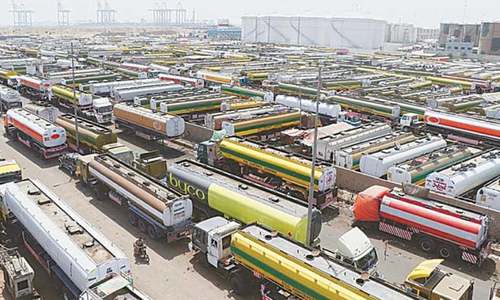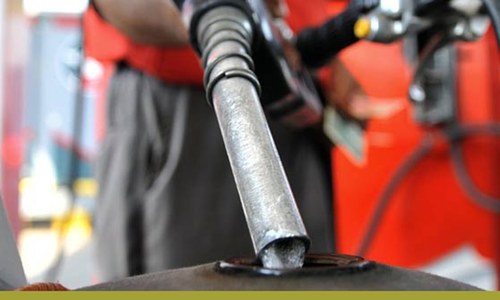ISLAMABAD: Amid continuously aggravating petroleum shortage across the country, the government has decided in principle to “completely deregulate” petrol pricing and marketing and do away with uniform pricing mechanism.
The decision comes at a time when oil marketing companies (OMCs) are under criticism for their cartelisation-like behaviour in the case of high octane blending component (HOBC), another deregulated product whose price has not seen a reduction in line with a massive decline in international oil prices.
Amid the media criticism, the Oil and Gas Regulatory Authority (Ogra) on Friday warned some of the leading OMCs over the exorbitant retail price of HOBC and hinted at referring the matter to the Competition Commission of Pakistan (CCP) for anti-competitive and collusive practices.
As part of discussions with the OMCs, the petroleum division has also decided in principle to link the price of petrol, commonly called Mogas92 by the oil industry, to Platt’s Oilgram of previous month instead of the current practice of pricing on the basis of actual import cost of the state-owned Pakistan State Oil (PSO).
The official record seen by Dawn suggests the authorities have clearly told the industry that petroleum product pricing frequency would remain on a monthly basis as the Economic Coordination Committee (ECC) of the cabinet had declined to shift it to a fortnightly basis.
However, the pricing formula will be converted into Platt’s Oilgram’s previous month average. Likewise, petrol price will be completely deregulated, including commissions of the OMCs and dealers on the pattern of HOBC.
The government has also agreed in principle with the oil industry that inland freight equalisation margin (IFEM) mechanism would also be deregulated that is currently used to keep the prices uniform throughout the country. This means the prices would significantly vary from one city to another and from one oil company to another. The consumer close to ports and refineries would be at an advantage to get products at cheaper rates while those away from ports and oil installations would have to pay a higher price. The difference could vary between Re1 and Rs5 per litre depending on the actual transportation cost.
Last week, Ogra wrote to the OMCs that it had observed that the price of HOBC being charged at various retail outlets was considerably higher than its cost. “Whilst this product is deregulated, however, in the interest of consumers it is expected that OMCs sell it at a reasonable price. There seems to be a form of consensus between various OMCs to sell HOBC at a much higher price,” it added.
It asked the OMCs to reduce the price to a reasonable level based on their costs, lest the CCP takes due notice of such cartelisation, and also keep Ogra informed about the steps for price reduction based on costs and healthy competition.
An official said that after deregulation of petrol price, Ogra at best would be able to issue such letters without any punitive action.
On the other hand, the petrol shortage appeared to be a countrywide phenomenon as some OMCs were completely dried out and the state-run PSO and a couple of other companies struggling to take the additional pressure from motorists and bikers. Hundreds of consumers with bottles and bikes could be seen outside a few petrol stations in major cities of Punjab and Khyber Pakhtunkhwa.
Officials said the gap between demand and supply was expanding due to a long break in arrival of imported products. They said a couple of vessels of petrol and diesel had anchored between May 27 and 31 and a couple of vessels of petrol and crude arrived at the end of last week.
By the end of Sunday, total usable stocks of petrol and diesel accounted for just seven and five days, respectively, but they were unevenly placed in various provinces and cities. The country has total petrol stocks of about 225,000 tonnes and the average daily consumption so far this month stood at 30,000 tonnes, much lower than normal days.
This could be seen from the fact that Punjab had total petrol stocks of 65,000 tonnes by Sunday evening, just enough for 3.5 days. Balochistan had total stocks of 1,300 tonnes that could last only 1.6 days, while KP had 10,000 tonnes for less than four days. Gilgit-Baltistan inventory stood at 460 tonnes that can last 3.5 days. In contrast, Sindh had about 145,000 tonnes of petrol and can serve the province for about 19 days.
The situation on the diesel front is no better. Total diesel stocks in the country now stand at less than 190,000 tonnes, an official said, adding that its average daily consumption was over 35,000 tonnes.
Diesel stocks in Punjab, KP and GB were for less than four days’ consumption, compared to 14 days and 10 days in Balochistan and Sindh, respectively. The official said the authorities were actively engaged with the OMCs and refineries to move products to the hard-hit regions and cities, but the supply chain had its own timeline constraints.
Published in Dawn, June 8th, 2020
































